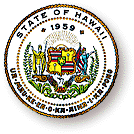
BOE committee
says state should
support surfingSurf clubs cannot now use schools'
names or mascots at meets
The state should recognize surfing as a school sport, a state Board of Education committee recommended last night after more than two hours of testimony from supporters of the measure.
The recommendation by the Student Services Committee goes to the full board, where the issue is expected to be voted on in October.
"I heard a couple of concerns raised, but not enough to overcome (the measure)," said board member Laura Thielen.
The state Department of Education does not recognize surfing as a sport on a team or club level, which means the agency is not liable for any accidents that may occur in a surfing club event. Surf clubs that have formed at about a dozen public schools are not allowed to use the name of their school or its mascot in competition.
More than 30 people, including state legislators, local business owners and educators, attended the meeting and testified in support of the measure.
Most highlighted the recreational, social and cultural benefits of surfing in the state where the sport was born.
Opponents of the measure have raised concerns about the safety and liability of a school-sponsored activity based on the open ocean. However, no one spoke against the proposal last night.
James Howe, a member of the Hawaiian Lifeguard Association who testified in support of the measure, told the board that "there's no arguing that the ocean environment can be a dangerous place.
"But it's not impossible to understand. The real key to safety is this knowledge of the ocean. The best insurance we can buy is making sure our students have good knowledge."
Avid surfers state Sen. Fred Hemmings (R, Kailua-Waimanalo-Portlock) and Rep. Marcus Oshiro (D, Wahiawa) testified that the sport is much safer than recognized contact sports, especially football.
"School surf clubs have been operating for several years and have never been sued," Oshiro said. "The board is wise to consider the risk of liability and should take into consideration that a noncontact sport like surfing poses less risk of injury than the contact sports currently authorized" by the department.
Some board members raised concerns about the potential costs of the sport, citing figures that put its financial needs at $2.67 million a season. The figure factors in new surfboards for about 1,000 students, fees for coaches and buses for transportation to practices and meets.
But Iris Gonzales, a Kahuku High school teacher who coaches the surf club at her school, said much of the cost of equipment and transportation would be shouldered by students and their parents.
Supporters also say some coaches are willing to volunteer their services, and businesses will likely help support the proposed clubs with sponsorships.
"I was always too small to play football," Roger Pai, a high school senior from Maui and a member of his school's surfing club, told the board. "For a team it'd be the right way to be recognized. By being on a team, I'd maybe even earn an athletic award."
